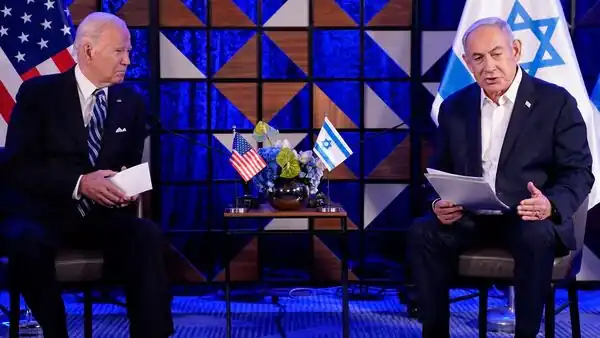In a defiant declaration, Israeli Prime Minister Benjamin Netanyahu has asserted that Israel is prepared to “stand-alone” in the face of mounting pressure from the United States, as the prospect of a full-scale invasion of Rafah in Gaza looms large.
The escalation follows the Israeli military’s commencement of what it terms a “limited” operation in Rafah on Monday, prompting thousands to flee the southern city. Despite repeated warnings from US President Joe Biden, cautioning against crossing a “red line,” Netanyahu remains resolute in his stance.
“If we need to … we will stand alone. I have said that if necessary, we will fight with our fingernails,” Netanyahu affirmed, invoking the resilience of Israel during the War of Independence in 1948.
However, the US has taken decisive action in response to the developments, suspending the delivery of significant military aid to Israel. The suspension includes 1,800 2,000lb (907kg) bombs and 1,700 500lb bombs, citing concerns over potential civilian casualties in Rafah.
President Biden, in an interview with CNN, indicated that further suspension of supplies, including artillery shells, would follow if the operation proceeds as planned.
This stern stance underscores the deepening rift between the two allies over Israel’s military actions in Gaza. Israeli Defense Minister Yoav Gallant dismissed the US warnings, asserting Israel’s steadfastness against any attempts at subjugation.
“We will stand strong, we will achieve our goals,” Gallant emphasized, signaling Israel’s determination to press forward with its objectives.
Meanwhile, the humanitarian situation in Rafah continues to deteriorate rapidly, with the UN reporting that over 80,000 residents have fled the city amid relentless bombardment.
Food and fuel shortages plague the remaining populace, exacerbated by the closure of the Rafah crossing with Egypt and challenges in aid delivery through the Kerem Shalom crossing with Israel.
Israeli forces maintain that they are conducting “targeted raids” against Hamas elements within Rafah while refusing to rule out the possibility of a full-scale invasion.
This uncertainty has prompted further concern from the international community, particularly in light of President Biden’s unequivocal stance on withholding military support.
As tensions escalate and the specter of conflict looms large, the fate of Rafah hangs in the balance. With diplomatic relations strained and humanitarian conditions worsening, the region teeters on the brink of a potentially devastating escalation.
The coming days are poised to test the resolve of both Israeli leadership and their allies as they navigate a delicate balancing act between security imperatives and international pressure for de-escalation.
This article was created using automation and was thoroughly edited and fact-checked by one of our editorial staff members

